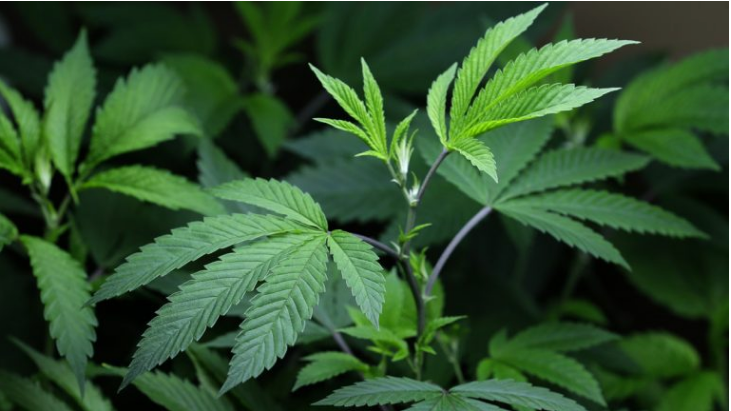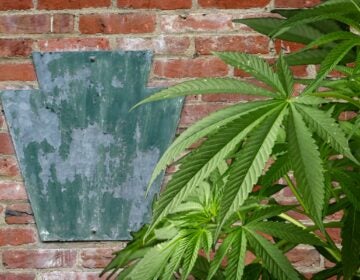Marijuana legalization bill clears Delaware House committee
A Delaware House committee voted to release a bill to legalize recreational marijuana to the full House after two hours of passionate testimony.

Legalization of the recreational use of marijuana is a matter of fierce debate. (AP Photo/Ted S. Warren, file)
A bill to legalize marijuana for those over 21 has cleared a House committee in Delaware’s General Assembly.
State legislators in the House Revenue and Finance Committee heard two hours of passionate testimony Wednesday from advocates on both sides of the debate. Those against the legislation expressed public health and safety concerns, while proponents argued it will take the marijuana industry out of the hands of black market dealers and end racial disparities among those arrested for possession.
“The multi-million-dollar cannabis industry, the thousands of jobs and large consumer base already exists in Delaware,” said Zoë Patchell, president of the Delaware Cannabis Advocacy Network.
“The decision before you is not whether you should allow the consumption, possession and sale of cannabis — but who should control one of the largest cash crops in Delaware? The criminal market, which creates crime and violence? Or the Department of Safety and Homeland Security and legal licensed business owners which create jobs and revenues for the state of Delaware?”
In June 2018, a measure to legalize recreational marijuana, sponsored by then-state Rep. Helene Keeley, failed in Delaware’s House of Representatives by four votes.
The new legislation sponsored by state Rep. Ed Osienski, D-Brookside, would allow adults 21 and older to purchase up to 1 ounce of marijuana taxed at 15% at the point of sale from a licensed retail marijuana store. It would create a licensing process through a newly created Office of Marijuana Control Commission.
‘Health should be the No. 1 concern’
Members of the business community, including the Chamber of Commerce, testified in opposition to the bill. They expressed concerns about impaired employees, and the Rehoboth Dewey Beach Chamber of Commerce fears it could increase use at the beach and drive away families.
AAA also testified against the legislation, arguing there’s no simple, accurate roadside test for marijuana impairment and that legalization would increase the number of impaired drivers on the road. Members of law enforcement also expressed concerns about public safety.
Members of the health community, including Division of Public Health Director Dr. Karyl Rattay, also testified against the legislation. There are several physical and mental health side effects to marijuana use, said Rattay, who is concerned marijuana could become a “gateway drug” for users.
The Medical Society of Delaware also is against the bill.
“It’s our position public health should be the No. 1 concern — not commercializing a drug for tax dollars,” said Dr. Mark Thompson, the society’s executive director.
Thompson said legalization should be delayed “until further research is completed on public health, medical, economic and social consequences of its use.”
He also noted the federal government lists marijuana as a schedule one drug with no accepted medical use and a high potential for abuse. That classification “limits the comprehensive research that can be performed to inform physicians and consumers in their decision-making,” Thompson said.
Proponents tout racial justice implications
Those in favor of the legislation focused on the criminalization of marijuana use. Members of the legal community argued too many non-violent citizens are affected by arrests.
Delaware Attorney General Kathy Jennings announced in February that her office would no longer prosecute people caught with up to 175 grams or a little more than six ounces of marijuana.
However, legalization advocates said Wednesday decriminalization is not enough. Civil citations for simple marijuana possession increased from 2,836 in 2016 to 3,660 in 2018. Proponents of legalization say arrests and citations can seriously affect a person’s life and livelihood.
Studies also show there is a racial disparity when it comes to marijuana arrests.
“Nowhere in this state or country is the racial, social and economic injustice more prevalent than the criminal justice system. We know blacks are three times more likely to be arrested for possessing cannabis than whites. Even though we know blacks, whites, yellows, purples, greens, everyone, buys, sells, and consumes cannabis at the same rate,” said Delaware attorney and marijuana advocate Tom Donovan.
“It’s time to get up to speed with what Delawareans need and want, which is justice for all.”
Paul Moliken told a personal story.
“I was arrested in 1989. I lost my job as an English teacher. I suffered months of depression and thoughts of suicide and lived under a triple threat. The constant fear of going to jail, the stigma of a convicted felon, and possibility of losing custody of my son,” he said.
“Despite my education, I wasn’t able to get anything other than menial work because I had to include the arrest on any job application. If it wasn’t for my family supporting me financially, I don’t know what I would have done. If I had been a minority however, I probably would have been in jail.”
Some legalization proponents still have concerns, however.
Medical marijuana advocates fear the legislation would negatively affect patients. The legislation would allow compassion center owners to apply for a recreational marijuana license, and patients say it could cut off the medical supply, which they say is currently limited.
‘I need the votes’
Osienski said his legislation would allow for the state’s Marijuana Commissioner to discontinue a license if medical patients were affected, however.
Several marijuana advocates also argued the legislation is too restrictive. They spoke out against the one-ounce limit, the limitation on how many licenses can be issued, the cost of obtaining a license, and the fact the bill does not allow individuals to grow cannabis at home.
“HB110 represents the corporate takeover of cannabis in Delaware. It only allows a small number of privileged corporations the ability to profit from the cultivation and sale of cannabis while continuing to criminalize a Delawarean who possesses more than one ounce or chooses to grow their own cannabis and that’s not fair,” said marijuana advocate Sam Chick.
Osienski said he fears home growing comes with the risk of getting pot into the hands of children.
The committee voted to release the bill for consideration by the full House. Osienski said the measure may not get a floor vote until next year.
Some legislators say while they are ready to release the bill from committee, they won’t be ready to vote on the legislation on the floor until certain amendments are made. Osienski said he’s willing to work with his colleagues to improve the bill.
“I need the votes. What I’m hoping is my colleagues will listen to their constituents because the percentage and numbers show constituents want this,” he said.
WHYY is your source for fact-based, in-depth journalism and information. As a nonprofit organization, we rely on financial support from readers like you. Please give today.




